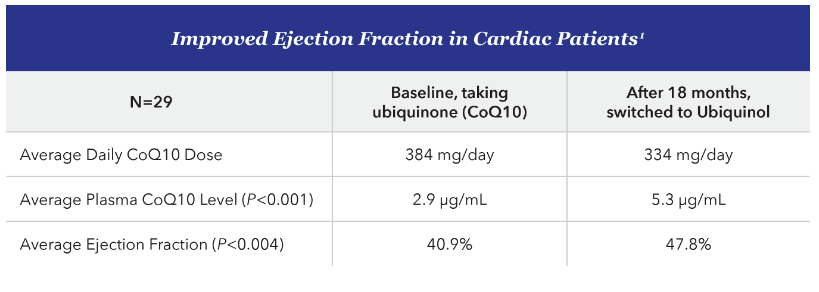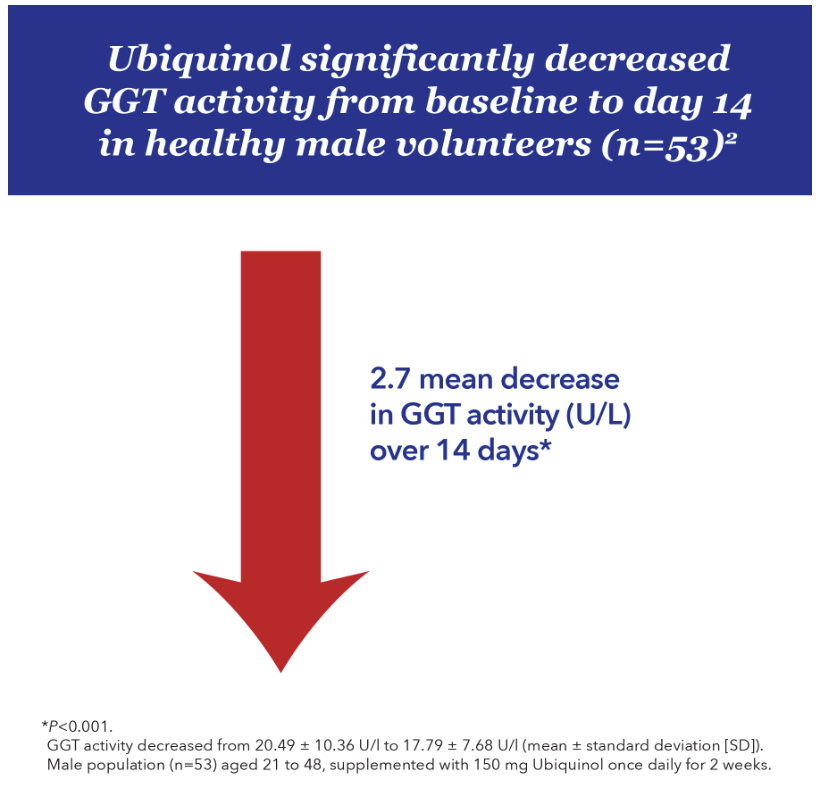The role of Ubiquinol in restoring depleted levels of CoQ10 and improving ejection fraction1
- In case reports of 29 cardiac patients, those patients who switched to Ubiquinol (average of 334 mg/day) from CoQ10 (average 384 mg/day) for 18 months experienced an increase in average serum CoQ10 level from 2.9 µg/mL to 5.3 µg/mL (P<0.001)1
- Average ejection fraction (EF), a measurement of the percentage of blood leaving (ejected from) the heart each time it contracts, improved from 40.9% to 47.8% (P<0.004)1
Higher Ubiquinol levels are shown to be associated with lower levels of blood markers of oxidative stress, including GGT, NT-proNBP, and CRP2-7
GGT (gamma glutamyltransferase)
Ubiquinol reduces GGT in men2
- GGT is considered a marker of oxidative stress3
- Elevated serum GGT levels are associated with the development of certain cardiovascular conditions3-5
NT-proBNP
Higher serum levels of Ubiquinol, an antioxidant, are associated with lower serum NT-proBNP (N-terminal pro b-type natriuretic peptide) levels6
- Elevated values of NT-proBNP are associated with certain cardiovascular conditions6
- To read more about how Ubiquinol acts as an antioxidant, click here
C-reactive protein
The relationship between CoQ10 and the serum level of c-reactive protein (CRP) was investigated in a large study population (n=1319; patient mean age of 48.0 ± 14.4 years)7
- Ubiquinol status in plasma was significantly (P<0.001) correlated to the concentration of CRP; the greater the levels of oxidized CoQ10, the greater the levels of CRP7
- CRP in the blood may be a sign of a health condition
- In a follow-up study with 53 healthy male patients, daily supplementation with 150 mg of Ubiquinol for 14 days significantly increased Ubiquinol plasma concentrations and decreased the CoQ10 redox status (% of oxidized form of CoQ10)7
Additional evidence
As reported in a small pilot study, Ubiquinol was shown to improve endothelial function in cardiac patients with reduced ejection fraction8
- Ubiquinol 400 mg/day for 3 months provided significant improvement in peripheral endothelial function in patients with HFrEF (heart failure with reduced ejection fraction) as measured by reactive hyperemia index (RHI)
- RHI significantly improved with Ubiquinol (P=0.026) but not with placebo (P=0.198)
- Subjects: n=14; mean age 70; 86% male
- To read about a larger study where Ubiquinol significantly improved endothelial function in healthy patients with mild-to-moderate dyslipidemia, click here.
References
- Langsjoen PH, Langsjoen AM. Supplemental ubiquinol in congestive heart failure—3 year experience. Presented at: 6th International CoQ10 Association Conference; May 29, 2010; Brussels, Belgium.
- Onur S, et al. Ubiquinol reduces gamma glutamyltransferase as a marker of oxidative stress in humans. BMC Res Notes. 2014;7:427.
- Lee D-H, Jacobs DR, Gross M, et al. Y-glutamyltransferase is a predictor of incident diabetes and hypertension: the coronary artery risk development in young adults (CARDIA) study. Clin Chem. 2003;49(8):1358-1366.
- Jousilahti P, Rastenyte D, Tuomilehto J, et al. Serum gamma-glutamyl transferase, self-reported alcohol drinking, and the risk of stroke. Stroke. 2000;31:1851-1855.
- Dhingra R, Gona P, Wang T, et al. Serum γ-glutamyl transferase and risk of heart failure in the community. Arterioscler Thromb Vasc Biol. 2010;30(9):1855-1860.
- Onur S, et al. Association between serum level of ubiquinol and NT-proBNP, a marker for chronic heart failure, in healthy elderly subjects. BioFactors. 2015;41(1):35-43.
- Fischer A, et al. Coenzyme Q10 redox state predicts the concentration of c-reactive protein in a large Caucasian cohort. BioFactors. 2016;42(3):268-276.
- Kawashima C, Matsuzawa Y, Konishi M, et al. Ubiquinol improves endothelial function in patients with heart failure with reduced ejection fraction: a single-center, randomized double-blind placebo-controlled crossover pilot study. Am J Cardiovasc Drugs. 2019. doi:10.3390/nu12041098.








